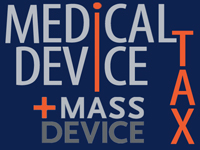
Group purchasing organization Premier wants the IRS to ensure that medical device makers aren’t planning to charge hospitals more for their products as a means of offsetting the burden of the impending 2.3% med-tech levy.
In a letter sent to the IRS today, Premier asked the IRS to protect hospitals from price hikes by requiring device makers to promise that the tax burden isn’t baked into the prices they and other health providers pay for devices.
"We believe that Congress did not intend to have hospitals and other providers absorb the device tax," according to the letter. "To this end, we urge the IRS to prevent device manufacturers from passing the tax on to providers by requiring, at the very least, that manufacturers certify that they have not included the tax in the price of their products on their requisite filing documents."
The effort is not in vain, as a handful of industry surveys have already found that medical device companies are looking for various ways to offset the cost of the medical device tax, including by raising prices for their products.
In a February survey of 180 medical device industry executives, over half said they would increase prices in order to absorb the cost of the med-tech levy. Other expected impacts included layoffs, budget cuts and general confusion about how to comply with the new law.
Premier had previously worked with device industry stakeholders to delay the impact of the law, public affairs VP Blair Childs told MassDevice.com, but the group doesn’t want to find its members bearing the brunt of the burden.
"It’s hard to prevent a tax from being passed on, obviously," he said. "I mean, you can’t legislate to say ‘don’t pass the tax on,’ but I think we want to try to prevent it from being added to an invoice. Not that I think anyone is going to do that, but I think we want to put a marker down."
Premier, which represents hospitals and other health care providers in reaching purchasing agreements with suppliers, wants to make sure the burden is shared and believes that hospitals are already paying dearly. The group’s concerns mirror similar remarks made by other health care stakeholders last year, who warned that, without proper controls, the device tax may turn into a windfall for device makers.
Those concerns were summarily dismissed by Medical Imaging Technology Alliance executive director David Fisher last April.
"I can tell you with 100% certainty that nobody in the medical device industry thinks they’re benefiting from the tax," Fisher said. "We were not on Capitol Hill lobbying for it."
Nevertheless, hospital groups aren’t ready to take it on faith that the med-tech tax won’t land in their laps.
"The intent of the device tax is to raise revenues from manufacturers to cover their share of financing health care reform," Childs wrote in the letter to the IRS. "Hospitals are already contributing their fair share, through policies that reduce hospital payment updates and Medicare and Medicaid disproportionate share hospital payments and that penalize hospitals based on rates of readmissions and hospital-acquired conditions."
"It’s really simply the concern that everybody in the hospital community has about the fact that margins are tight in the hospital world," Childs told us in a phone interview. "Hospitals have now got productivity cuts that are occurring for them and they’ve got cuts in their market basket updates; there’s a variety of things that are already hitting hospitals."
In an exclusive interview with MassDevice.com last month, former Philips Healthcare (NYSE:PHG) CEO Steve Rusckowski framed the impact of the medical device tax as a simple ultimatum:
"We only have 2 ways to deal with this: Raise prices or lower costs," Rusckowski told us. "Lower costs mean less employment. It’s that simple."
"We’re not going to drop earnings and therefore we only have a few alternatives," he said. "One is we have to compensate for it somehow through pricing. Sending price increases back to the marketplace is not good for health care costs. Second is no longer investing in new engineers, new manufacturing facilities."
"We want innovation in this country as much as anybody else does, we certainly wouldn’t want something that would impede innovation – I’m not sure the device tax will," Childs told us. "We need to drive this out through increased efficiency within companies. The device industry needs to find ways to improve productivity and efficiency overall."
"We’re going to keep pushing this," he added. "We want to prevent the tax from being passed on as best we can."
Updated May 7, 2012, at 8:10 p.m. with comments from Premier public affairs VP Blair Childs.

